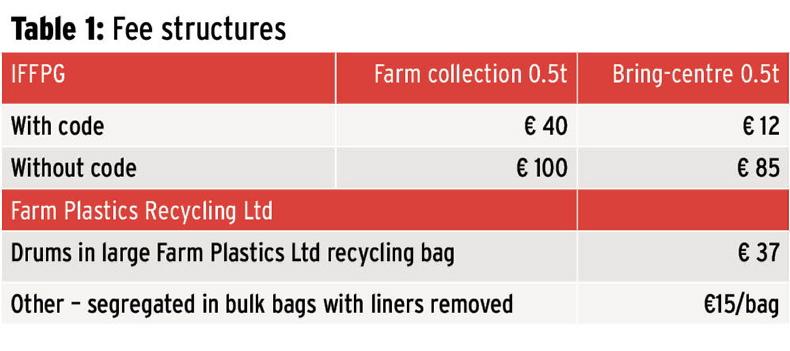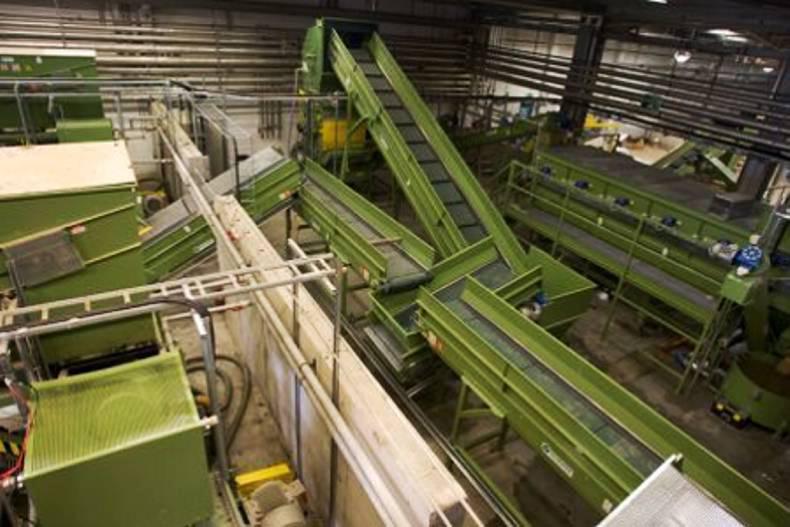Farmers are now becoming much more proactive when it comes to recycling. One area where there has been a huge improvement is used silage wrap and covers. Now more than ever, farmers can dispose of wrap in an environmentally friendly way at a reasonably low cost.
The Irish Farm Film Producer Group Ltd (IFFPG) is Ireland’s only Government-licensed recycling compliance scheme, responsible for providing an efficient and cost-effective farm plastics recycling service to farmers nationwide.
The Irish Farmers Journal recently spoke with IFFPG general manager Liam Moloney to find out more about the service and what happens to the plastic once it is left off at the collection site.
Plastic collection
Liam says the IFFPG organises a number of bring centre collection sites at marts, co-operatives and GAA pitches on specific dates throughout the year.
At these sites IFFPG contractors provide weighing facilities and farmers are charged a weight-based fee of €12 per 0.5t of silage cover/wrap. As you can see in Table 1, charges for the recycling service vary depending on whether you have a six-digit label code.

The label shows proof of purchase from an IFFPG plastic producer member and is given to the farmer when he purchases the wrap.
The bring-centres also accommodate other categories of used farm plastics through IFFPG’s sister company Farm Plastics Ltd. Plastics such as net wrap, small and large fertiliser bags, meal bags and drums are covered.
All these other categories can be brought to the centres. They should be segregated in bulk fertiliser bags with the liners removed. Disposal cost is €15 per bag.
Drums should be thoroughly washed out and brought to centres in the large Farm Plastics Recycling Ltd bag, available from local co-ops. Liam says this bag can be purchased for €7 and disposed of for €30 per bag.
The IFFPG also organises farmyard collections of silage plastic through its network of contractors. The IFFPG contractors collect at farmyards with rigid trucks and cranes.
Liam says that the cost of this service is €40 per 0.5t of silage wrap when a label code is available and €100 if the code is not available.
Plastic presentation
The way plastic is presented in bring-centres has improved a lot according to Liam. He says in the past the state in which some wrap was presented was variable, with silage waste, tyres and concrete blocks mixed though the silage covers.
In recent years, it has improved a lot, with covers much cleaner and different materials segregated.
The IFFPG contractors inspect material and remove any visible contamination when baling prior to material being moved to recycling facilities for processing.
The IFFPG is now encouraging farmers to store silage wrap and covers dry and clean.
“If the plastic is dry and clean, costs are reduced for the farmer and the IFFPG’s transport costs are lower too,” explained Liam.
He says because farmers are paying by weight, it makes sense for them to reduce the moisture on the plastic that can add to the weight and in turn their costs.
Where it is not possible to store indoors, plastic should be left on a clean concrete base and separate from bale netting.
JFC has developed a special container called Tidy Wrap for storing silage wraps dry and tidy. The recommended retail price is €285 incl VAT. It can store 100 to 150 round bale wraps.
JFC claims it is beneficial to farmers because wraps are kept dry, which they say helps to keep recycling costs down. Storage is also tidier compared with stockpiling plastic in the corner and transportation is improved.
To use the container, farmers cut the first bale wrap carefully to create an insert (similar to a bin liner). They then pack wraps into the container.
When it is full, the top of the insert wrap is tied and the container is removed. A package similar to a wrapped bale is left which is easy to transport.

Plastic recycling
The IFFPG is sending in the region of 25,000t to 27,000t of plastic for recycling annually. Liam says this equates to a recycling rate of over 70%.
Once the plastic is collected at the bring-centres or direct from the farmyard, the contractors bale it up to aid transport. According to Liam the IFFPG’s policy is to send plastic to Irish facilities first where possible for recycling. If this isn’t possible, plastic is sent elsewhere in Europe. The main Irish facility that takes silage plastic is Filmco in Tipperary. The process of recycling silage plastic in Filmco is:
A number of different consumer-related products are created from these pellets, such as refuse sacks, silage wrap, building materials, radon barriers, wheelie bins, etc.